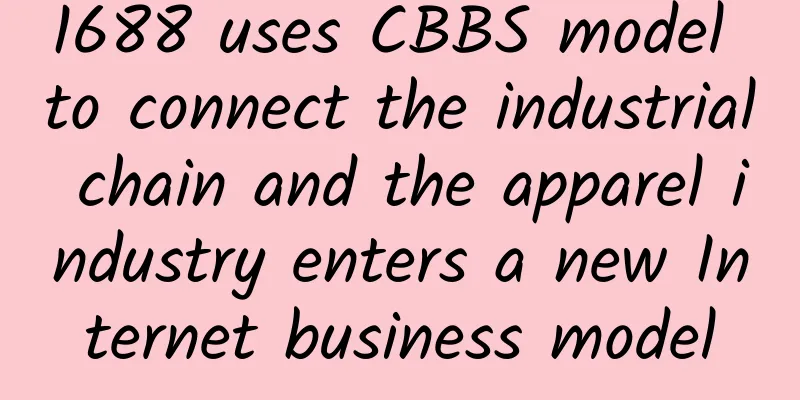1688 uses CBBS model to connect the industrial chain and the apparel industry enters a new Internet business model

|
On May 28, the heads of 1688, Taobao, Tmall, and more than 80 well-known domestic and foreign companies such as Swarovski China, Metersbonwe, and Liebo gathered at Alibaba Binjiang Park. From e-commerce platforms to raw material suppliers and manufacturers in the clothing industry chain, they gathered together to discuss how to enter a new Internet business model. Jack Ma once pointed out that the new business model is CBBS: C (consumer); Small B (channel dealers); Big B (manufacturer); S (service). Only by taking C (consumer demand side) as the origin, B (supply side) as the end point, and allowing S (service provider) to participate, can the entire industrial chain be truly and effectively reconstructed, and the detonating point will be C2B. Just half a month ago, a news report that "Tmall has booked 12 small appliance production lines for exclusive customization for online shoppers" attracted widespread attention. The focus was on the fact that this was a thorough C2B (production is guided by consumer trends and demands) model. This was the first time that an Alibaba-owned platform had presented the C2B concept together with the future trends of the e-commerce industry to people in a direct manner. And C2B is just one part of this new business model. This time, 1688 invited world-class brand suppliers such as Swarovski China, Beijing Xuelian Group, Ordos Group, the National Wool Textile Product Quality Supervision and Inspection Center, and France's STYLE-VISIO to settle in, which is to penetrate the entire CBBS link into the clothing industry. Xuelian and Ordos, as large manufacturers (B), provide first-class quality clothing materials; the National Wool Textile Product Quality Supervision and Inspection Center and France's STYLE-VISIO provide services (S), including quality inspection, fashion trend analysis, etc.; Swarovski not only provides fashion luxury raw materials, but also provides diamond-studded pattern references and guidance, integrating B and S; small B (channel merchants) include Tmall's original brands and traditional clothing brands. Wu Minzhi, president of Alibaba's B2B business group, pointed out that whether it is Taobao, Tmall or 1688, clothing and accessories are their largest and most mature categories, so this new Internet business model will first test the waters in the entire clothing industry supply chain. Dong Fang, the person in charge of Tmall's clothing category, pointed out that big data can first predict fashion trends and allow manufacturers to better meet market demand. "Compared to traditional retail, Tmall and Taobao generate more data dimensions. Favorites, shopping carts, page views, search keywords, and actual purchases can all be used as references. If the number of people searching for denim skirts suddenly increases, this demand and comparison data can be immediately sent to the source manufacturer. Mr. Lu, vice president of Tmall original brand Aka, expects B-end manufacturers to pay more attention to C-end data, "so that they can prepare goods according to fashion trends and even give us some guidance. For small and medium-sized clothing companies, it can reduce a lot of inventory pressure." First-class brand manufacturers are more eager to learn C-end data through B-end sales when they join 1688. It can be seen that every link in the new model is looking forward to the opening of this cycle. For Alibaba, through this new Internet business model of CBBS, through the ecosystem of the entire industrial chain, it can connect the resources of 1688, Tmall, Taobao, and Alipay, thereby opening up the entire e-commerce industry chain. In this system, information flow and capital flow flow through the Internet, and information is faster and more transparent. The future structure of Alibaba's several e-commerce platforms may be just like what Jack Ma predicted: consumers and distributors trade on Taobao and Tmall, B2B continuously supplies distributors, and then distributors feed back consumers' individual needs to manufacturers and guide them. In such a new e-commerce chain, all participants are equal. The starting line between enterprises is the same, and the different results are due to the difference in effort, product quality, and service level, rather than the possession of resources and relationships. Small businesses can get orders that large companies cannot get through hard work. Consumers and enterprises are equal, consumers can effectively supervise enterprises, and consumers decide the category of products and the way of service. |
<<: China's luxury goods market may be saturated and is facing a rational "cooling down" trend
>>: eMarketer: Brand blogs get the highest ROI from weekend posts
Recommend
The role and efficacy of kudzu root
Kudzu root, also known as Pueraria root, is a foo...
What are the effects and functions of fairy grass
Generally, fairy grass is a kind of medicinal mat...
Why do some bank card numbers have 16 digits and some have 19 digits?
Do you know what the numbers on your ID card repr...
Can eating bananas relieve constipation? Not true! Such bananas will aggravate the symptoms
gossip In our daily lives, we are often advised a...
How much basic knowledge do you know about our home planet?
This article is based on answering similar questi...
The efficacy and function of the eight-angle maple flower
The star-shaped maple flower is a medicinal mater...
The efficacy and function of Little Red Man
Little Red Man is a traditional Chinese medicine....
Study finds COVID-19 survivors at high risk of death within 12 months
Since the outbreak of the new coronavirus pandemi...
The medicinal value of the bird-free tree
The bird-free tree is a shrub, and because it has...
Real-time "error correction" for quantum computers! Why don't you go to space, AI?
Quantum computers have the potential to revolutio...
What are the effects and functions of deer antler grass
Deer antler grass is actually a perennial herb wi...
The efficacy and function of daizheshi
Traditional Chinese medicine is a good choice for...
AR Technology Part 2: Visiting the Hefei Advanced Light Source
The Hefei Advanced Light Source (HALF) is a fourt...
How far are we from the sun? If we live to 80 without sleep, our 54th generation descendants will be able to reach it
We all know that common units for expressing dist...
The efficacy and function of pear wood ash
Speaking of pear wood ash, we are all familiar wi...









